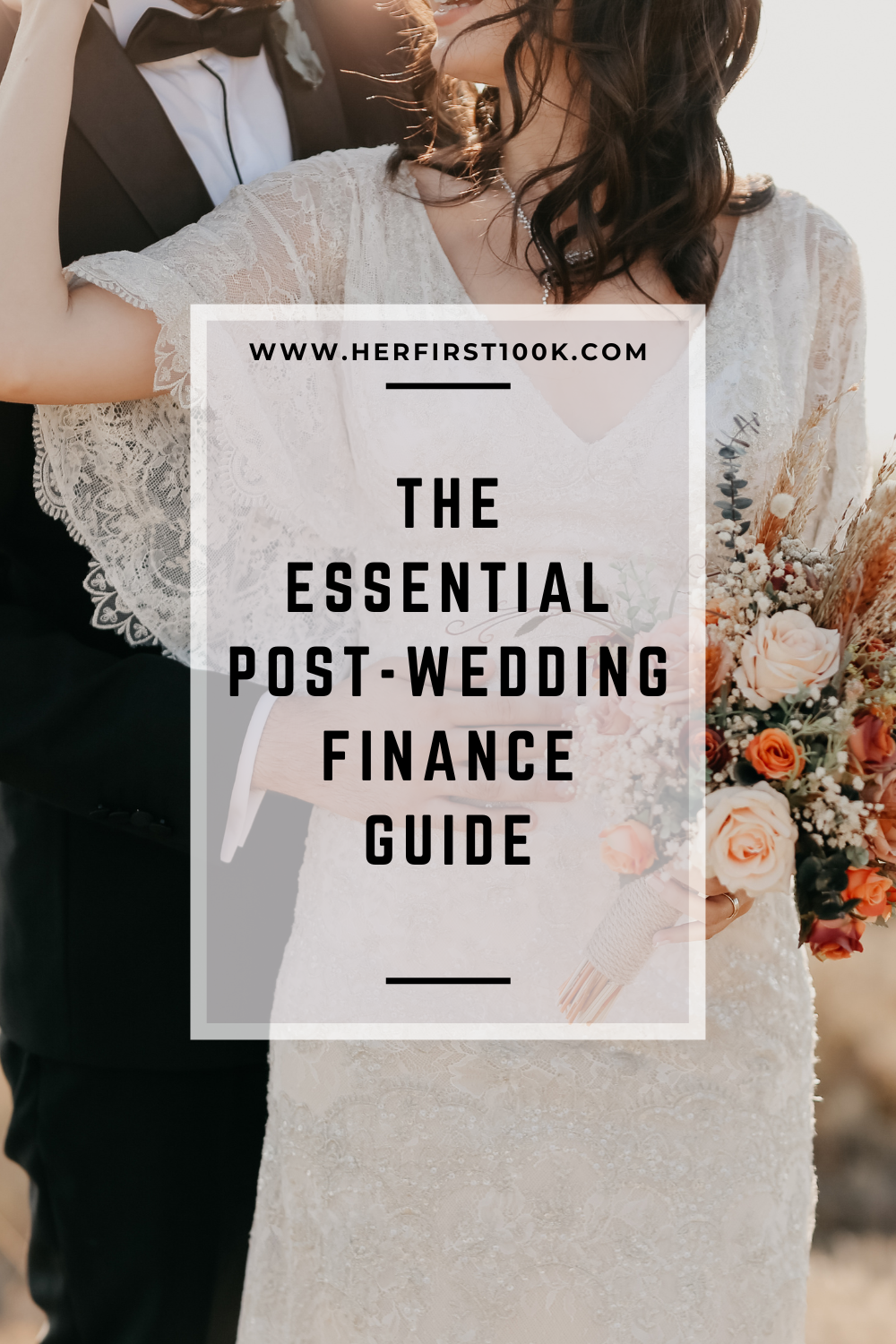The following article may contain affiliate links or sponsored content. This doesn’t cost you anything, and shopping or using our affiliate partners is a way to support our mission. I will never work with a brand or showcase a product that I don’t personally use or believe in.
The Essential Post-Wedding Finance Guide that Every Newlywed Needs
You spent months planning the perfect wedding, and everything went off without a hitch. You had the honeymoon of your dreams, and now you are back home basking in newlywed bliss. You think to yourself, “What could possibly ruin this feeling?”
And then it happens: the credit card bill shows up in the mail, your landlord decides to raise the rent, and your car suddenly needs a pricey emergency service. Before you know it, you find yourself wondering, “what the hell happened to my newlywed bliss??”
Sound all too familiar? If so, you’re not alone.
Money stress is one of the most common killers of the “honeymoon phase” for newlyweds, and in fact can have a really long-lasting negative impact on relationships: a survey conducted by the Certified Divorce Financial Analyst professionals found that “money issues” are the third leading cause of divorce. Yeah, we don’t like thinking about that either.
So how do you avoid money disagreements as newlyweds? Well, the first step is talking about money with your partner.
We know, we know: a lot easier said than done. Talking about money with a partner can feel intimidating, taboo, or even shameful – especially if your money situation isn’t quite where you want it to be.
But being able to openly discuss money with your partner is an essential part of having a healthy and long-lasting relationship. So today we are giving you the framework you need to initiate beneficial money conversations with your partner and create a financial game plan that will set you up for long-term financial and romantic success!
Honeymoon phase forever? Let’s. F*cking. Go!
Set a recurring money date
We’ve already established that talking about money with your partner can be a liiiiittle uncomfy (okay, maybe really uncomfy), but it doesn’t have to be!
One of the ways that we suggest couples become more comfortable with talking about money together is by setting up a recurring money date.
The money date is exactly what it sounds like: a designated time to sit down with your partner and your money and really get to know each other. The goal of the money date is to look at your finances together and gain a thorough understanding of what the heck is going on in your relationship money-wise.
Not only will a regular money date allow you to be aware of your finances as a couple, but it will also give you the opportunity to check in on your financial goals and figure out what is and isn’t working for you financially.
During your money date, you and your partner will want to take as thorough of a look through your finances as possible. Look at your bank statements, credit card bills, and investment accounts. Look for charges that you don’t recognize on your account. Look for subscriptions that you no longer need. Look at how much money you have coming in, how much money is going out, and where that money is being spent. Money dates are an essential part of good personal finance and your financial education.
Basically, you want to get to know the ins-and-outs of you and your partner’s finances so that you can be confidently aware of your financial situation and create an appropriate plan to reach your shared financial goals.
Be aware that being comfortable talking about money with your partner is a skill: the more you practice it, the more comfortable and confident you will become. So start by making your money date a monthly occurrence, and find ways to make it as enjoyable as possible. Crack open a bottle of wine, play your favorite music in the background, put on pajamas, order a pizza, and start to get comfortable with the idea of openly examining and discussing your finances with your partner.
Get to know your partner’s money personality
It is no surprise that we all have our own unique relationship with personal finance. From an early age, we form certain emotional attachments to and beliefs about money based on our personal experiences with money. These emotional attachments and beliefs in turn affect the way that we think about and use money throughout our life, and these may look very different from the financial attachments and beliefs of our partner.
We refer to the way that someone thinks/feels about and uses money as their “money personality,” and getting to know your partner’s money personality is a valuable way of gaining a deeper understanding of their money motivations, habits, priorities, and beliefs.
Here are some questions that you and your partner can ask each other to become more familiar with each other’s money personalities:
-
What is your earliest money memory?
-
Do you have a positive or negative perception of money?
-
Do you consider yourself to be more of a saver or more of a spender?
-
What kind of relationship do you want to have with money?
-
What does personal finance look like to you?
-
How does thinking about money make you feel?
-
What role does money play in your life?
Not only will these conversations help you gain a better understanding of each other’s personal relationships with money, but they will also help you become more comfortable with money discussions and allow you to grow closer as a couple.
Get a thorough understanding of each other’s debts
Marriage will give you many things: a life partner, an additional income, some tax breaks, and maybe even a fancy new last name. Oh, and all of your partner’s debt. Woohoo! *insert crying emoji here*
While debt is a very normal part of life, disclosing the total balance of your debts to your partner can make anybody feel nervous. But when you get married, many aspects of your personal finances will become intertwined with that of your partner – debt included – so it is of the utmost importance to get a thorough understanding of each other’s debts ASAP.
Your first money date is the perfect opportunity to get up close and personal with each other’s debts. Come prepared with a full list of all of your debts, what kind of debt they are (i.e. credit card, medical, student loans, etc.), the balances of each, their interest rates, and the terms under which you have to pay them, as well as your credit score and how you use credit in your day-to-day life.
Reviewing this information in detail with your partner will give you a more thorough understanding of your financial standing as a couple and can help you decide how to merge your finances as a married couple.
Do you and your partner need help breaking out of the cycle of accumulating debt and enduring debt-related shame? Set yourselves up for debt pay-off success with our course, Debt Defeater! Debt Defeater will help you understand, make a plan, and pay off your debt once and for all – all without shame and judgment. Best wedding gift ever? We couldn’t agree more.
Set financial goals together
You have already dreamt of what your lives will look like as a married couple – now this is the time to put those dreams into action.
Do you want to buy a house in five years? Maybe starting a family is on the horizon? Have plans to backpack across Europe before age 35? Want to pay off your student loans by the end of the year?
Take some time to set specific personal finance goals together so that you can ensure that you are both on the same page for your short and long-term financial goals.
Set a budget
Once you have set your financial goals you can move onto creating a budget that is appropriate for your means, sustainable for your lifestyle, and moves you closer to reaching your financial goals.
In a spreadsheet (we highly recommend using The Badass Budget spreadsheet. It’s pretty…ya know…badass), write down all of your monthly income and expenses. After your monthly expenses have been subtracted from your total joint incomes, use the remaining money to direct money towards your personal finance goals like saving for a home, paying off debt, investing in the stock market, etc.
Remember, your budget is only as useful as your ability to maintain it, so your budget needs to be realistic and sustainable. We are all about saving money and spending mindfully, but if your budget is so strict that it requires you to feel deprived of all the things that you enjoy, it is going to be very difficult to maintain.
Determine how you will organize your money
HFK’s founder, Tori, recently posted a video on TikTok that caused a bit of a stir. In it, she shares some reasons why she, as a personal finance expert, does not recommend that married people merge their bank accounts.
Now we know that the modern expectation is that upon getting married, couples need to adopt a “what’s mine is yours” mentality. But just because this is an accepted practice does not mean that it is the only option or the best option.
So why don’t we like the idea of spouses completely merging their incomes? Well, for a couple of reasons:
Maintaining separate bank accounts can be a comfortable starting point for many couples as they navigate managing their finances together for the first time.
Going from managing your own personal finances to suddenly managing the finances of two people can be overwhelming and will require a period of adjustment. By maintaining separate accounts, you and your partner can gradually ease into sharing parts of your financial responsibilities as you become more familiar with each other’s incomes, expenses, and debts.
Separate bank accounts allow you to maintain a sense of financial freedom outside of your relationship.
While you should be working with your partner to maintain a budget that works for both of you and moves you towards your shared financial goals, you should also have the freedom to make purchases or investments that align with your values without having to run it by your partner.
Plus, how are you going to ever surprise your partner with a gift if they can see every purchase that you make in your joint bank account?
Maintaining separate bank accounts encourages you and your partner to develop personal financial literacy
While we all hope to enter into marriages that will be lifelong, sometimes things don’t end up that way.
Too often we see one partner (heterosexual women in particular) enter into a marriage and immediately give their spouse complete control of their joint finances. Due to being so financially “hands-off,” that partner is less likely to have a thorough understanding of their personal finances and develop the skills and knowledge necessary for a healthy relationship with money.
In the case of a divorce or the death of a spouse, that partner will have an extremely difficult time advocating for themself financially and transitioning to managing their own personal finances.
Finally, maintaining a separate bank account offers financial protection
It is a sad reality that we must address: financial abuse occurs in 99% of cases of domestic violence. The more access an abuser has to your finances, the more power they have over you and the more difficult it becomes for you to leave the unhealthy relationship.
You never should feel stuck in a relationship because you can’t afford to get out of it. By maintaining your own bank accounts, you will always have access to the financial resources you need to prioritize your safety and wellbeing.
Rather than completely merging your bank accounts with your partner, we suggest that you both maintain separate bank account, but open a joint account(s) in which both you and your partner contribute and is used to for shared expenses, debts, and savings goals.
This money management approach will require intentional effort and communication between you and your partner which is just another reason to be consistent with your monthly money dates! While managing multiple accounts may feel a bit complicated at first, it will ultimately ease many of the financial strains that can come with managing your money as a couple.
Decide who manages what
Once you have organized your money into your respective accounts and laid out your monthly expenses, decide who will be responsible for staying on top of which payments.
Even if all of your recurring expenses are coming out of your joint account, one partner should be the designated person for staying on top of the due dates, notices, and changes to certain expenses.
Maybe you want to handle the phone bill, the car payment, and the credit card bill while your partner manages rent, utilities, and insurance. You will both commit to staying up-to-date with your respective expenses and will share any important information or changes with your partner during your monthly money date.
Want this process to be even easier? Set as many of your bills on auto-pay as possible so you never miss a payment.
Figure out your tax status
We know that the LAST THING you want to think about after your wedding is filing taxes, but now that you are a married couple, the way that you file your taxes may change.
As a married couple, you have the opportunity to file taxes jointly or separately. Now the IRS really likes when couples file jointly, so they offer some pretty great tax breaks to couples that file together, and this usually means that it’s the most beneficial for married couples to file jointly.
However, there are select instances in which it may be better for you and your partner to file your taxes separately. These are usually pretty specific to your unique financial situation, so if you think you may benefit from filing separately, we would encourage you to talk to your tax professional to ensure that it is the best financial decision for you and your partner.






